2013年浙江中考英语第一轮复习语法精析第六讲动词
文档属性
| 名称 | 2013年浙江中考英语第一轮复习语法精析第六讲动词 |

|
|
| 格式 | zip | ||
| 文件大小 | 3.3MB | ||
| 资源类型 | 教案 | ||
| 版本资源 | 通用版 | ||
| 科目 | 英语 | ||
| 更新时间 | 2013-01-04 00:00:00 | ||
图片预览

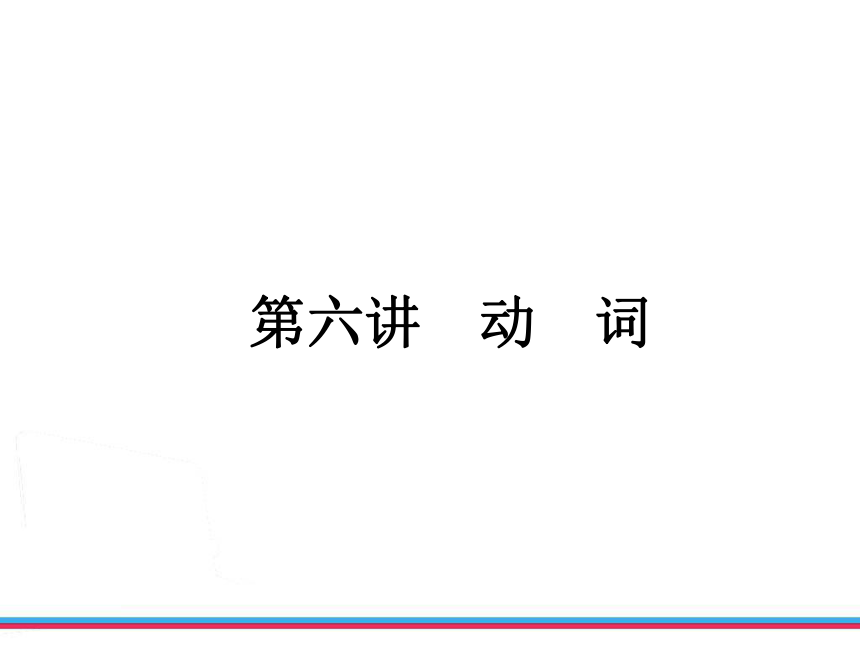

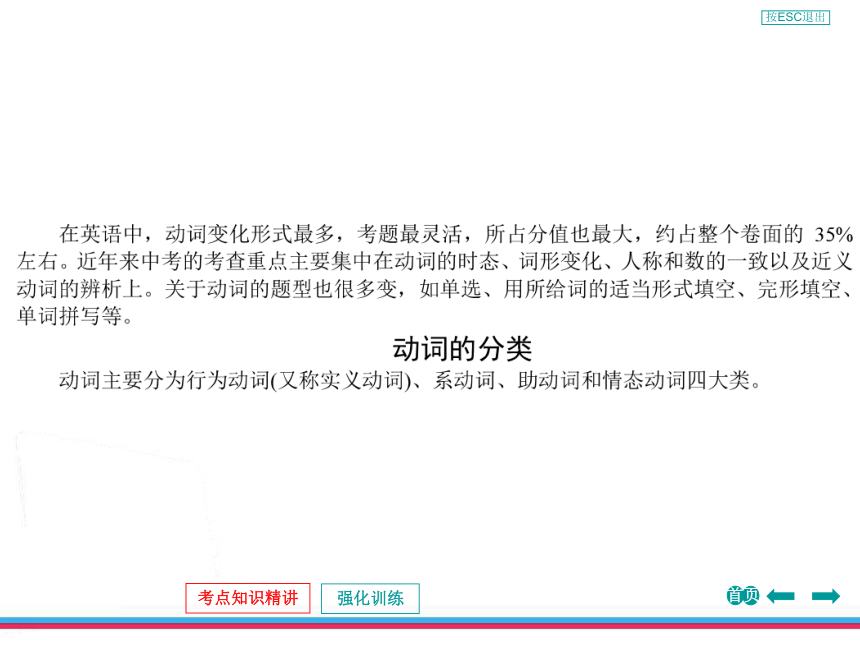
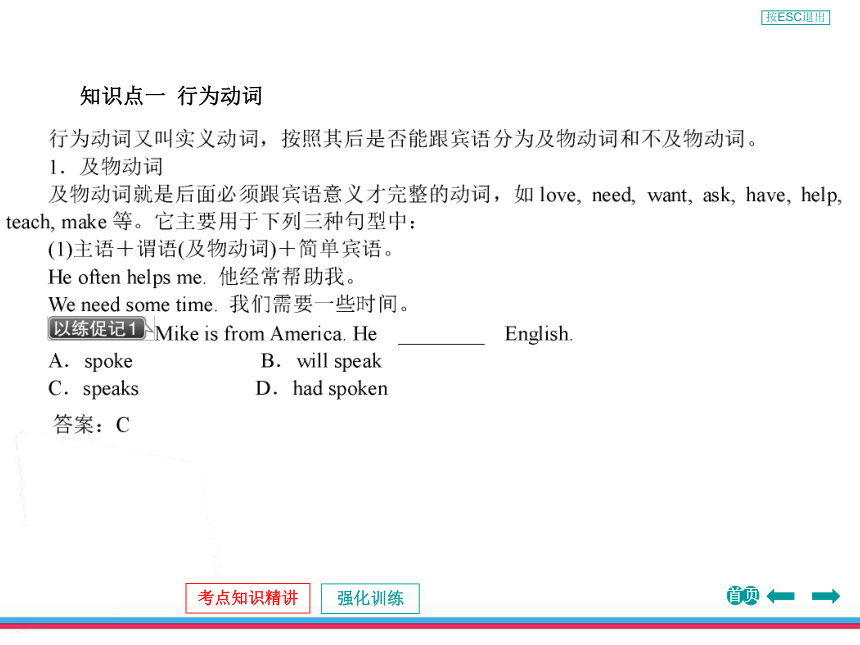
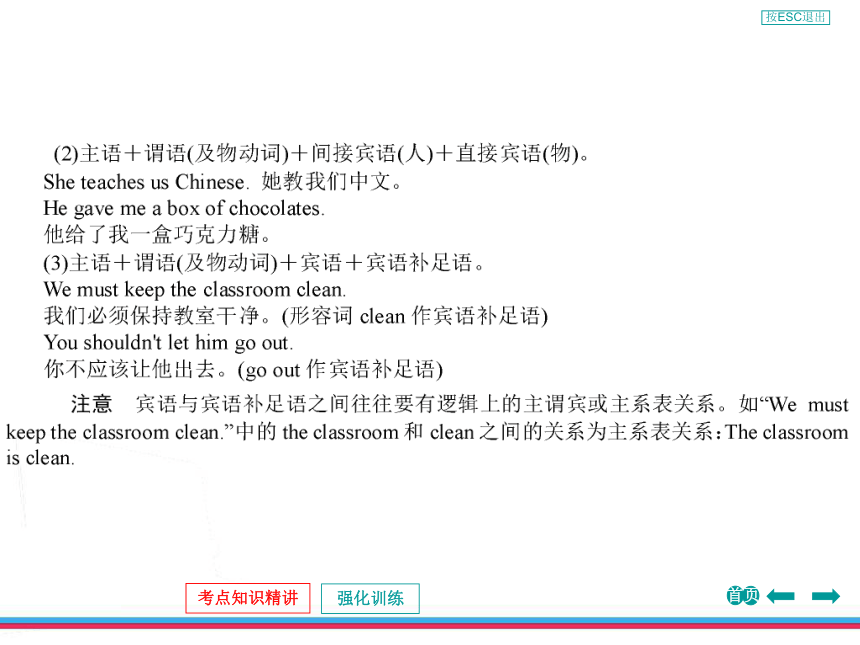
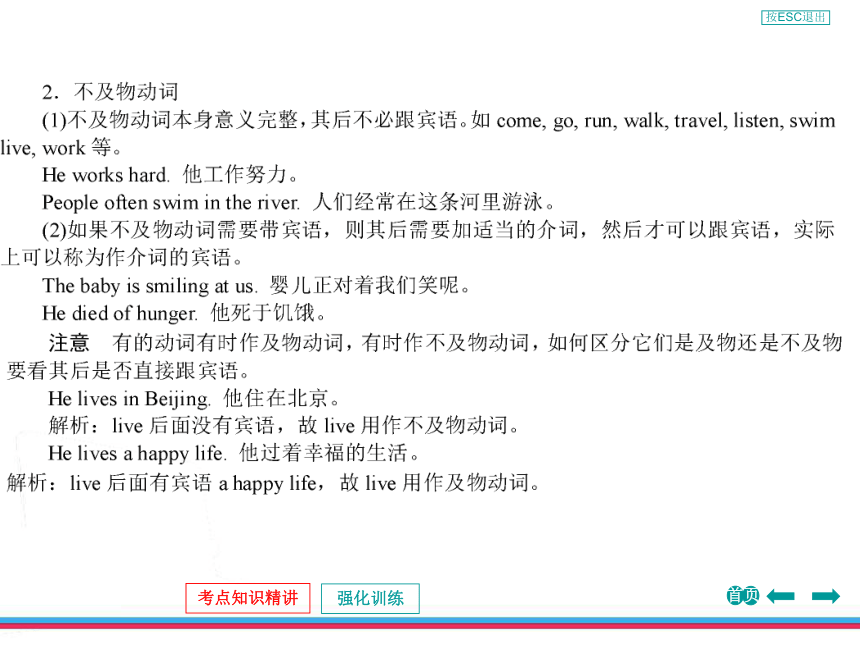
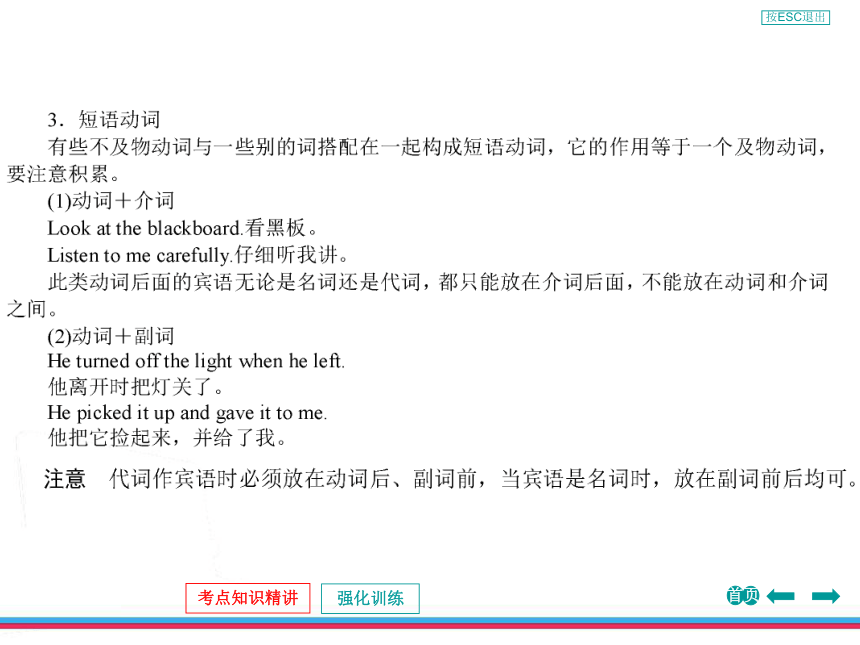
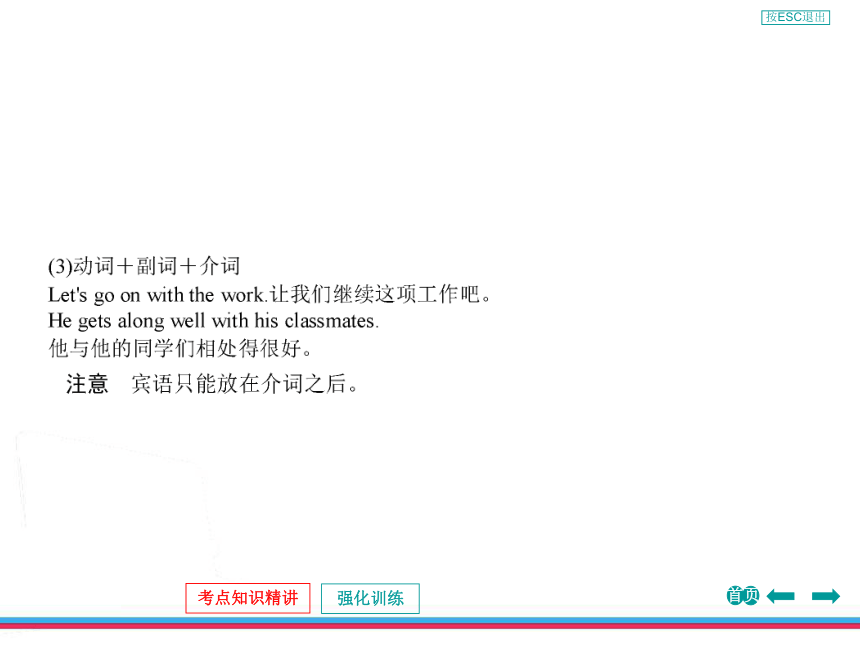
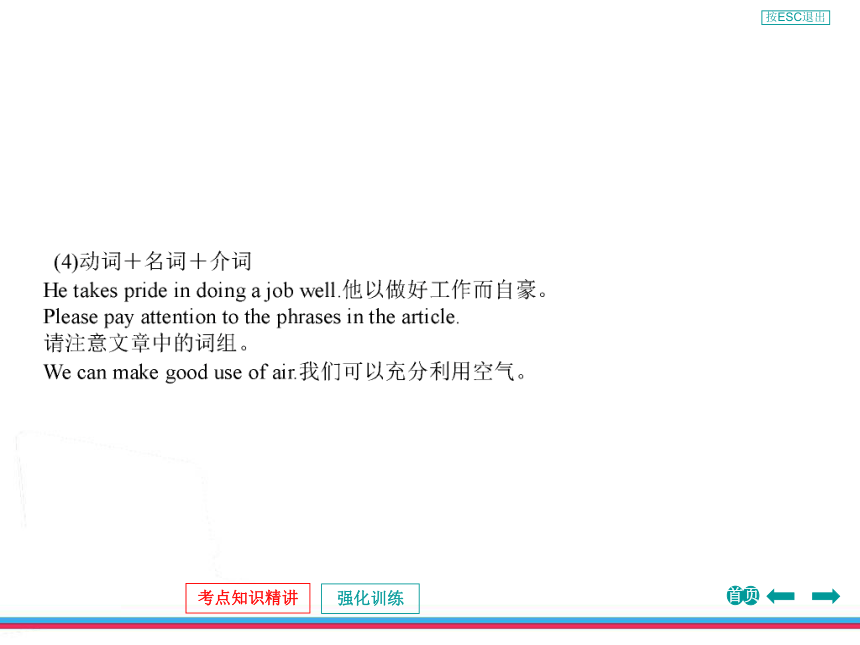
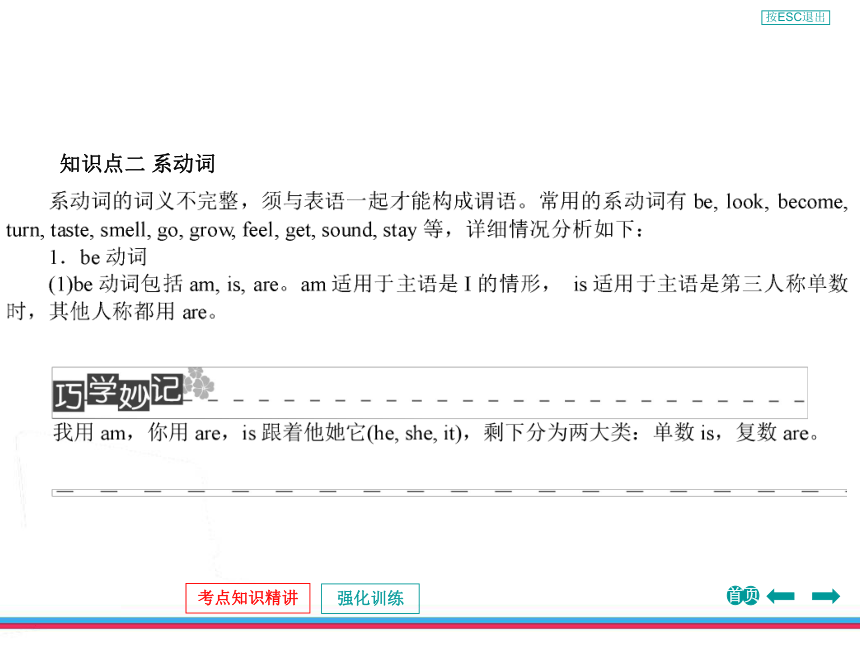
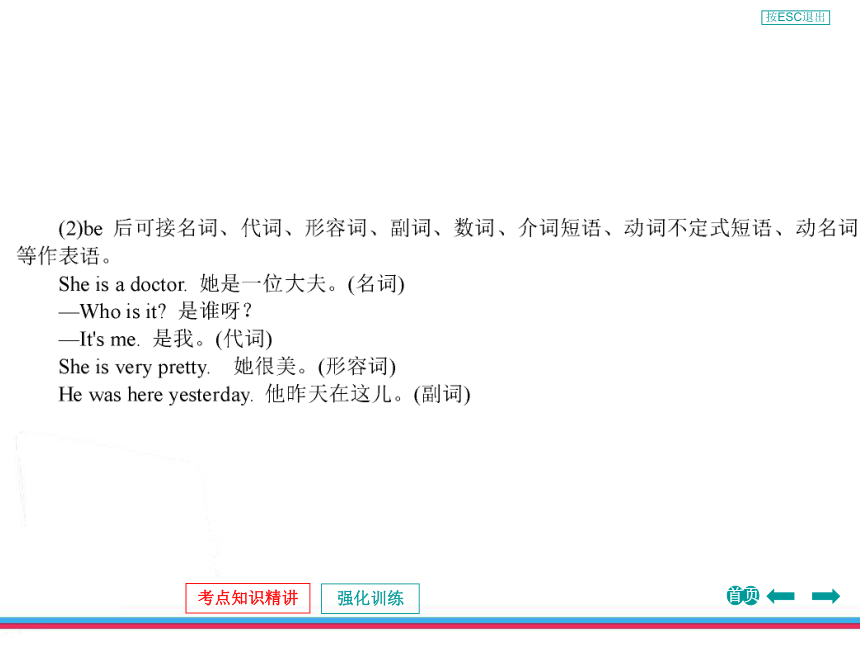
文档简介
课件141张PPT。英 语 2013年浙江中考第一轮复习第六讲 动 词 知识点一 行为动词知识点二 系动词知识点三 助动词知识点四 情态动词动词的时态
知识点一 一般现在时知识点二 一般过去时知识点三 一般将来时知识点四 现在进行时知识点五 过去进行时知识点六 现在完成时知识点七 现在完成进行时知识点八 过去完成时知识点九 过去将来时非谓语动词
知识点一 动词不定式知识点二 分词强化训练6 动词的分类1.(2012·河南)The Internet is so closely connected with our daily life. Can you ________ a life without it?
A.understand B.imagine C.consider D.expect
解析:考查动词辨析。understand“理解,明白”;imagine“想象”;consider“考虑”;expect“盼望”。由前一句话“互联网与我们的日常生活如此密切相关”推知此处句意应为“你能想象没有它(互联网)的生活吗?”故选B项。
答案:B
2.(2012·连云港)I prefer ________ some shopping to ________ camping since the weather isn't lovely.
A.do;going B.doing;go
C.do;go D.doing;going
解析:考查动词的用法。prefer doing sth.to doing sth.连接两个动名词短语,意为“相比于做某事更喜欢做某事”。故选D项。
答案:D 3.(2012·乌鲁木齐)I don't think we'll be able to______ any travel if we don't save our money.
A.afford B.spend C.cost D.pay
解析:考查动词辨析。由“if we don't save our money”可知,“我们”支付不起旅游的费用。afford“支付得起,买得起”,符合句意。故选A。
答案:A
4.(2012·武汉)The roof of the house needs repairing.It's raining now, you'd better get something to________ rain drops.
A.control B.cover C.carry D.catch
解析:考查动词辨析。catch rain drops“接住/装雨水”,符合语境。故选D。
答案:D 5.(2012·长沙)—The model ship is wonderful.
—It ________ me two days to make it.
A.took B.cost C.spent
解析:考查动词辨析。take“花费”,常用于“It takes sb.time/money to do sth.”结构中,意思是“花费某人时间/金钱做某事”;cost“价钱为”,主语是物;spend“花费”,主语是人。故选A。
答案:A
6.(2012·呼和浩特)—I won't have time to go shopping with you this afternoon.
—But you________ me yesterday.
A.ordered B.mentioned C.promised D.knew
解析:考查动词辨析。order“命令”;mention“涉及”;promise“许诺”;know“知道”。根据转折词But可知,此处表示“你昨天许诺了要和我一起去购物”,故选C。
答案:C 7.(2012·天津)The cloth __________ very soft and comfortable.
A.smells B.tastes C.feels D.sounds
解析:考查感官动词的词义辨析。句意为“这布料摸起来很柔软舒适”。故选C。
答案:C
8.(2012·西宁)Last Thursday when I got to the station, I ________ I had left my ticket at home.
A.understood B.realized C.believed D.seemed
解析:考查动词辨析。understand“理解”;realize“意识到”;believe“相信”;seem“看起来”。句意为“上周四当我到达车站时,我意识到我把票忘在家里了”。故选B。
答案:B 9.(2012·沈阳)After the students ________ their exams, they celebrated by having a party.
A.passed B.failed C.joined D.gave
解析:考查动词词义辨析。pass“通过”;fail“失败”;join“参加”;give“给予”。句意为“学生们通过考试后,他们举行了派对来庆祝”。故选A。
答案:A
10.(2012·黄冈)—Do you have Jay's CDs?
—Sorry, they are ________.But we'll get some more next week because they ________.
A.sold well; are on sale B.sold out; sell well
C.selling well; sell well D.for sale; sell well
解析:考查固定词组搭配。sell out“卖完”,可以用被动语态;sell well“畅销”,不能用被动语态。句意为“你有Jay的唱片吗?”“对不起,已经卖光了。但是我们在下周将再进一些来,因为很畅销”。故选B。
答案:B 11.(2012·重庆)You don't have to worry about me.I'm old enough to ________ myself.
A.look after B.look for C.look up D.look at
解析:考查由look构成的短语辨析。look after“照看;照顾”;look for“寻找”;look up“向上看;(在词典中)查找”;look at“看”。句意为“你不用担心我,我足够大了,可以照顾自己”。故选A。
答案:A
12.(2012·河南)—What smells terrible, Ted?
—I'm sorry.I'll________ my shoes and wash them at once.
A.take away B.give away
C.move away D.get away
解析:考查动词短语辨析。take away“拿走”;give away“分发,泄露”;move away“移动”;get away“离开”。根据“什么闻起来这么难闻”以及“I'm sorry.”可知,此处表示“我马上把我的鞋拿去洗”,故选A。
答案:A 13.(2012·武汉)After winning the badminton championship at Wuhan Sports Center in May, the Chinese players' faces ________ with joy.
A.made up B.took up C.put up D.lit up
解析:考查动词短语辨析。make up“组成,构成”;take up“占用,开始从事”;put up“张贴,举起”;light up“(使)变得喜悦,(使)兴奋起来”。根据“winning the badminton championship”可知选D。
答案:D
14.(2012·包头)Can you go and find out when the plane to New York________?
A.puts off B.gets off C.takes off D.breaks off
解析:考查动词短语辨析。put off“推迟”;get off“下车”;take off“脱下,起飞”;break off“中断”。由主语“the plane”可知,此处表示去纽约的飞机何时起飞,故选C。
答案:C 15.(2012·贵阳)When you leave the reading room, you should remember to________ the lights.
A.turn on B.turn down
C.turn off
解析:考查动词短语辨析。turn on“打开”; turn down“关小”;turn off“关上”。根据“当你离开阅览室时”可知,此处表示“你应该记得把灯关上”,故选C。
答案:C
16.(2012·吉林)—I missed the early bus and I had to ________ the next one on such a cold morning.
—Bad luck!
A.wait for B.look up C.care for D.put up
解析:考查动词短语辨析。wait for“等待”;look up“查阅;向上看”;care for“照顾,关心”;put up“举起;张贴”。上句句意为“我错过了早班车,我不得不在如此冷的早上等下一班”。
答案:A 17.(2012·河北)________ your name on the paper and you can get a magazine.
A.Cut down B.Look down
C.Turn down D.Put down
解析:考查动词短语辨析。cut down“削减”;look down“俯视”;turn down“关小”;put down“写下”。句意为“把你的名字写在纸上,你就可以获得一本杂志”。故选D。
答案:D
18.(2012·广东)—________ I swim here?
—I'm sorry.Children ________ swim alone here.
A.Must;can't B.May;must
C.Can;mustn't D.Can't;can
解析:考查情态动词的用法。must“必须”;can“可以”,用于拜托或请求;mustn't“不许”,表禁止;can't“不能”;may“可以”。句意“我可以在这里游泳吗?”“对不起。孩子们不许在这里单独游泳。”问句表示请求,答语表示禁止。故选C。
答案:C 19.(2012·成都)—Excuse me, whose Japanese book is this?
—It ________ be Tom's.In our class, only he is studying Japanese.
A.must B.can't C.would
解析:考查情态动词。根据“In our class, only he is studying Japanese.”可知,日语书一定是汤姆的。must表示肯定推测和判断,意为“肯定,一定”。故选A。
答案:A
20.(2012·武汉)—You ________ be happy with the strong public support you've received.
—Yes,you're right.I'm really excited.
A.may B.can C.must D.need
解析:考查情态动词表猜测的用法。由答语的内容可推知上句句意为“获得公众的大力支持你一定很高兴”。表示肯定猜测而且把握性很大时用must,故选C项。
答案:C 21.(2012·重庆)—Mom,must I clean my room now?
—No,you ________.You can do it tomorrow.
A.can't B.needn't C.mustn't D.shouldn't
解析:考查情态动词的用法。英语中,由情态动词must构成的一般疑问句,其肯定回答用Yes,...must.;否定回答用No,...needn't.。由答语中的“No”及“You can do it tomorrow.”可知,此处是否定回答,故选B。
答案:B
22.(2012·黄石)—Is Maria knocking at the door?
—It________ be her.She is in Australia now.
A.may not B.needn't C.mustn't D.can't
解析:考查情态动词。may不用于否定的推测;needn't“不需要”;mustn't“禁止”;can't表示否定的推测。根据答语“她现在在澳大利亚”可知,此处表示“否定的推测”,意思是“不可能是她”。故选D。
答案:D 23.(2012·南昌)Last year I ________ drive.I used to take the bus.
A.could B.couldn‘t C.should D.shouldn't
解析:考查情态动词。由“I used to take the bus.”可知,去年“我”不会开车。couldn't意为“不会,不能”,符合语境。故选B。
答案:B
24.(2012·呼和浩特)—________ I try on those shoes in the window?
—________.They are just on show.
A.Could;Yes,you can
B.Can;Sorry,you couldn't
C.Could;Sorry,you can't
D.Can;Yes,you could
解析:考查情态动词can与could的辨析。由答语“它们只用于展览”可知是对上句的否定回答,排除A、D两项;表示请求时,could比can语气更委婉,答语中不能用could,排除B项。故选C。
答案:C 25.(2012·苏州)—I hear you've got a new iPhone 4S.________ I have a look?
—Yes, certainly.
A.May B.Do C.Shall D.Should
解析:考查情态动词的用法。请求看对方的手机应该用比较委婉的语气,may在表示许可或请求许可时,语气委婉,故选A。
答案:A
强化训练7 非谓语动词 一、单项填空
1.(2012·包头)________ energy, turn off the hot water after you take a shower.
A.Save B.Saving C.Saved D.To save
解析:考查非谓语动词。由语境可知,关掉热水的目的是节约能源。动词不定式作目的状语,符合语境。故选D。
答案:D
2.(2012·上海)Don't jump to a conclusion!Let's ________ the problem first.
A.to discuss B.discuss
C.discussed D.discussing
解析:考查let的用法。let sb.do sth.意为“让某人做某事”是固定用法。故选B。
答案:B 3.(2012·南充)It's quite exciting ______ me ______ the Internet.
A.for;surf B.for;to surf C.for;for surf
解析:考查固定搭配。本题属于“It's +adj.+for sb.+to do sth.”的句式。句意为“对我来说,上网冲浪真的很令人兴奋”。故答案为B。
答案:B
4.(2012·西宁)The teacher often told Mike________ too much time playing computer games.
A.not to spend B.to not spend
C.doesn't spend D.not spend
解析:考查非谓语动词。根据“tell sb. not to do sth.”结构可知,此处为“老师经常告诉迈克不要在玩电脑游戏上花费太多的时间”,故选A。
答案:A 5.(2012·凉山)I find ________ hard for me ________ the work in such a short time.
A.it's;finish B.it;finishing C.it;to finish
解析:考查it的用法和句式结构。第一空所缺的词是it,此时it是形式宾语,真正的宾语是其后的动词不定式结构“to finish...”。故答案为C。
答案:C
6.(2012·重庆)Mr.Li asks the students ________ in the river, because it's too dangerous.
A.swim B.to swim
C.not to swim D.to not swim
解析:考查动词不定式的否定形式。根据下文“it's too dangerous”可知,此处用动词不定式的否定形式。ask sb. not to do sth.“要求某人不要做某事”。故选C。
答案:C 7.(2012·连云港)Jeremy Lin ________ an unknown basketball player in New York Knicks for quite a long time.
A.used to be B.used to being
C.is used to be D.was used to be
解析:考查非谓语动词。used to do sth.意为“过去(常常)做某事”。由句意“林书豪在过去相当长的一段时间内是纽约尼克斯队一位知名度不高的篮球运动员”可知A项正确。
答案:A
8.—Are you going to the party________ at Smith's home this evening?
—I will if I am free.
A.holding B.held
C.to hold D.to be held
解析:考查不定式及被动语态。根据句意可知今晚的聚会还未举行,故应用动词不定式表示未发生的动作,可排除A、B两项;又因party和hold之间为被动关系,故选D。
答案:D9.(2012·呼和浩特)—Which dress do you like best, Madam?
—Sorry, I can't decide________ now.
A.to buy which one B.buy which one
C.which one to buy D.which I should buy it
解析:根据“特殊疑问词+动词不定式”作宾语结构可知,应选C。
答案:C
10.(2012·绵阳)Excuse me, would you mind________ your voices down, please?
A.to keep B.keeping C.keep D.kept
解析:考查非谓语动词。mind后跟动名词,故选B项。
答案:B 11.(2012·孝感)The peaceful music in the CD made the students________ relaxed.
A.feel B.feels C.felt D.to feel
解析:考查非谓语动词。make sb. do sth.是固定用法。
答案:A
12.(2012·上海)Stop ________ about the traffic.Just think about what we can do to improve it.
A.complain B.to complain
C.complaining D.complained
解析:考查非谓语动词。stop to do sth.“停止正在做的事去做别的事”;stop doing sth.“停止正在做的事”。根据“Just think about what we can do to improve it.”可知,这里是指停止抱怨,抱怨是正在做的事情,故选C。
答案:C 13.(2012·河北)________ a book in the library, enter a key word into the computer.
A.To find B.Find C.To write D.Write
解析:考查非谓语动词。分析句子结构可知,前后两句间无连词,应用非谓语动词,排除B、D两项。句意为“如果你想在图书馆找到某本书,在电脑上输入关键字就能找到”。故选A。
答案:A
14.How kind you are!You always do what you can ______ me.
A.help B.helping C.to help D.helps
解析:考查非谓语动词的用法。句意“你真好!你总是做你能做的来帮助我”。设空处用不定式作目的状语,故选C项。
答案:C 15.(2012·天津)—Why don't you go out to play, Rose?
—I'm afraid I can't.I have much homework ______.
A.do B.does C.doing D.to do
解析:考查动词不定式。在这里用动词不定式作宾语补足语。故选D。
答案:D
16.(2012·无锡)My father doesn't like shopping much. He would rather _______ TV at home than _______ around for hours in shops.
A.watch;walk B.watch;to walk
C.to watch;to walk D.to watch;walk
解析:考查固定短语。would rather do sth. than do sth.表示“宁可做某事而不做另一件事”,故选A。
答案:A 17.(2012·成都)Parents often ask their kids________ their internet friends because the kids may be in danger.
A.to meet B.not to meet C.meeting
解析:ask sb. not to do sth.“让某人不要做某事”,由句意可知选B项。
答案:B
18.(2012·南昌)You need to take notes at the meeting so make sure ________ a pen and some paper with you.
A.bring B.bringing
C.to bring D.not bring
解析:考查动词不定式。make sure to do sth.为固定搭配,意为“确保做某事”。故选C。
答案:C 19.(2012·乌鲁木齐)We should practice________ English as much as possible.
A.speak B.speaking C.to speak D.speak in
解析:考查非谓语动词。practice doing sth.“练习做某事”,为固定短语,故选B。
答案:B
20.(2012·绥化)It's going to rain.Don't forget ______ an umbrella.
A.to take B.taking C.to make
解析:考查非谓语动词。forget to do sth.“忘记做某事”;forget doing sth.“忘记做过某事”。结合语境可知选A项。
答案:A 强化训练8 动词的时态和语态 一、单项填空
1.(2012·武汉)—What's his brother?
—He is a teacher.He ________ maths at a school.
A.taught B.has taught
C.teaches D.will teach
解析:考查一般现在时态。因为问句和答语的前半部分都用了一般现在时态,根据问答一致的原则,此处也要用一般现在时态。故选C项。
答案:C 2.(2012·武汉)—Where's Lisa,Eric?
—She ________ to the library.
A.goes B.had gone
C.has gone D.would go
解析:考查have/has gone to的用法。have/has gone to表示“去了某地(但还没有回来)”。问句意为“艾瑞克,丽萨在哪里?”,由此可知丽萨不在说话现场,应是“去了某地”。故选C项。
答案:C 3.(2012·广东)Jenny ________ in the kitchen when you called her at 5 o'clock this afternoon.
A.is cooking B.was cooking
C.cooks D.cooked
解析:考查动词的时态。A项是现在进行时;B项是过去进行时;C项是一般现在时;D项是一般过去时。根据句意“当你今天下午五点给珍妮打电话的时候,她正在厨房做饭”可知,给珍妮打电话发生在过去,而珍妮在厨房做饭这件事在打电话时正在进行,故空白处的时态为过去进行时。故选B。
答案:B 4.(2012·上海)I'm sure that stricter rules to control cigarette smoking ________ very soon.
A.made B.will make
C.were made D.will be made
解析:考查被动语态。从句中的主语是rules,是动词make的动作承受者,故用被动语态,且句中“very soon(很快)”是表示将来的时间,故用一般将来时态的被动语态。故选D。
答案:D
5.(2012·重庆)Sanya is a beautiful city.I ________ there twice.
A.have gone B.have been
C.have gone to D.have been to
解析:考查have/has been to与have/has gone to的用法区别。由题中twice“两次”可知“我”去过两次了。have/has been to表示“去过某地”;have/has gone to则表示“去了某地,不在说话现场”;空格后为there,应省略to。故选B。
答案:B 6.(2012·南昌)-Hello, mum.Are you still on Lushan Mountain?
-Oh, no.We are back home.We ________ a really good journey.
A.have B.had
C.are having D.will have
解析:考查动词的时态。由“We are back home.”可知,“我们”已经回来了,“度假”一事发生在过去,应用一般过去时。
答案:B
7.(2012·陕西)—Sam, come downstairs, please.I need your help.
—Sorry,mum.I ________ on the phone.
A.am talking B.talked
C.was talking D.have talked
解析:考查动词的时态。由“Sorry”可知,“通电话”这一动作正在进行,因此用现在进行时。故选A。
答案:A 8.(2012·北京)I ________ Mr.Smith since he moved to Shanghai.
A.didn't hear from
B.don't hear from
C.won't hear from D.haven't heard from
解析:考查动词的时态。由“since he moved to Shanghai”可知,本题用现在完成时。故选D。
答案:D
9.(2012·河北)The clothing store ________ a sale.The clothes there are very cheap.
A.has B.had
C.is having D.was having
解析:考查动词的时态。根据后一句可知,现在的衣服卖得很便宜。由此可推断出,服装店正在打折,应用现在进行时。故选C。
答案:C 10.(2012·河北)Your sweater looks smart.Where _______ you ________ it?
A.do;get B.did;get C.will;get D.have;go
解析:由上句“你的毛衣看起来很好看”推知买衣服的动作已经结束,故下句用一般过去时,结合句意“你在哪儿买到它的?”可知B项正确。
答案:B
11.(2012·北京)—Where were you last Saturday?
—I ________ in the Capital Museum.
A.am B.will be C.was D.have been
解析:考查一般过去时态。由问句中的时间状语last Saturday可知用一般过去时。故选C。
答案:C 12.(2012·呼和浩特)—I'm afraid the class has begun.
—Don't worry.It________ until the bell________.
A.doesn't begin; rings
B.won't begin; will ring
C.won't begin; rings
D.doesn't begin; will ring
解析:考查动词的时态。根据语境可知,此处表示“课直到铃响了才会开始”,即还没有开始上课,应用一般将来时;until引导的从句应用一般现在时表示将来,故选C。
答案:C 13.(2012·黄冈)—What did Yang Ying say?
—She said they ______ a school trip the next weekend.
A.will have B.had
C.would have D.have
解析:考查动词的时态。根据“She said”可知,主句为过去时,再根据“the next weekend”可推断出从句是将来时态。因此,would have符合时态要求。故选C。
答案:C 14.(2012·黄冈)—Hey,Molly.You ________ on the phone just now.But you weren't here and the man left a phone number.
—Oh?I was in the library.
A.wanted B.are wanted
C.were wanted D.have wanted
解析:考查被动语态。由“刚才有人打电话找你”可知应是“被别人找”。而且句中just now意为“刚才”,是过去时的标志词,故用过去时态的被动语态。故选C。
答案:C
15.(2012·福州)—Our classroom________every day.
—So it is.It's our duty to keep it clean and tidy.
A.cleans B.is cleaning C.is cleaned
解析:考查被动语态。教室作为主体,应当是被打扫,所以应使用被动语态。故选C。
答案:C 16.(2012·青海)Because of the support from all over the country, beautiful new buildings ________ here and there in the earthquake-hit areas in Yushu.
A.can be seen B.can see
C.would be seen D.will see
解析:考查动词的语态。buildings与see之间存在被动关系,can be seen为被动结构,符合语境。故选A。
答案:A
17.(2012·呼和浩特)No decision________ about that matter yet.We are still considering it.
A.has been made B.has made
C.will be made D.will make
解析:考查动词的时态和语态。A项是现在完成时的被动结构;B项是现在完成时;C项是一般将来时的被动结构;D项是一般将来时。根据yet可知应用现在完成时,decision与make之间为被动关系,所以应用现在完成时的被动结构,故选A。
答案:A 18.(2012·沈阳)It ________ usually ________ at this time of year, but today it is raining heavily.
A.is; raining B.won't; rain
C.has; rained D.doesn't; rain
解析:考查动词的时态。由“usually”和“at this time of year”可知,此处表示客观情况,应用一般现在时;根据“but today it is raining heavily”可知,第一个空应为否定形式。故选D。
答案:D
19.(2012·河南)—Have you heard of Earth Day?
—Yes.The first Earth Day ________ in 1970 to educate us to protect our planet.
A.celebrates B.celebrated
C.is celebrated D.was celebrated
解析:由The first Earth Day可知此处用一般过去时,排除选项A和C;由句意“1970年,第一个地球日被庆祝,以教育我们保护我们的星球”推知选项D正确。
答案:D 20.(2012·陕西)A new club ________ in our school at the beginning of this year and now it has many members.
A.starts B.is started
C.has started D.was started
解析:考查被动语态。因为主语“a new club”是动词start的动作承受者,故用被动语态。因为时间是“at the beginning of this year(在今年年初)”,应用一般过去时。故选D。
答案:D Thanks!
知识点一 一般现在时知识点二 一般过去时知识点三 一般将来时知识点四 现在进行时知识点五 过去进行时知识点六 现在完成时知识点七 现在完成进行时知识点八 过去完成时知识点九 过去将来时非谓语动词
知识点一 动词不定式知识点二 分词强化训练6 动词的分类1.(2012·河南)The Internet is so closely connected with our daily life. Can you ________ a life without it?
A.understand B.imagine C.consider D.expect
解析:考查动词辨析。understand“理解,明白”;imagine“想象”;consider“考虑”;expect“盼望”。由前一句话“互联网与我们的日常生活如此密切相关”推知此处句意应为“你能想象没有它(互联网)的生活吗?”故选B项。
答案:B
2.(2012·连云港)I prefer ________ some shopping to ________ camping since the weather isn't lovely.
A.do;going B.doing;go
C.do;go D.doing;going
解析:考查动词的用法。prefer doing sth.to doing sth.连接两个动名词短语,意为“相比于做某事更喜欢做某事”。故选D项。
答案:D 3.(2012·乌鲁木齐)I don't think we'll be able to______ any travel if we don't save our money.
A.afford B.spend C.cost D.pay
解析:考查动词辨析。由“if we don't save our money”可知,“我们”支付不起旅游的费用。afford“支付得起,买得起”,符合句意。故选A。
答案:A
4.(2012·武汉)The roof of the house needs repairing.It's raining now, you'd better get something to________ rain drops.
A.control B.cover C.carry D.catch
解析:考查动词辨析。catch rain drops“接住/装雨水”,符合语境。故选D。
答案:D 5.(2012·长沙)—The model ship is wonderful.
—It ________ me two days to make it.
A.took B.cost C.spent
解析:考查动词辨析。take“花费”,常用于“It takes sb.time/money to do sth.”结构中,意思是“花费某人时间/金钱做某事”;cost“价钱为”,主语是物;spend“花费”,主语是人。故选A。
答案:A
6.(2012·呼和浩特)—I won't have time to go shopping with you this afternoon.
—But you________ me yesterday.
A.ordered B.mentioned C.promised D.knew
解析:考查动词辨析。order“命令”;mention“涉及”;promise“许诺”;know“知道”。根据转折词But可知,此处表示“你昨天许诺了要和我一起去购物”,故选C。
答案:C 7.(2012·天津)The cloth __________ very soft and comfortable.
A.smells B.tastes C.feels D.sounds
解析:考查感官动词的词义辨析。句意为“这布料摸起来很柔软舒适”。故选C。
答案:C
8.(2012·西宁)Last Thursday when I got to the station, I ________ I had left my ticket at home.
A.understood B.realized C.believed D.seemed
解析:考查动词辨析。understand“理解”;realize“意识到”;believe“相信”;seem“看起来”。句意为“上周四当我到达车站时,我意识到我把票忘在家里了”。故选B。
答案:B 9.(2012·沈阳)After the students ________ their exams, they celebrated by having a party.
A.passed B.failed C.joined D.gave
解析:考查动词词义辨析。pass“通过”;fail“失败”;join“参加”;give“给予”。句意为“学生们通过考试后,他们举行了派对来庆祝”。故选A。
答案:A
10.(2012·黄冈)—Do you have Jay's CDs?
—Sorry, they are ________.But we'll get some more next week because they ________.
A.sold well; are on sale B.sold out; sell well
C.selling well; sell well D.for sale; sell well
解析:考查固定词组搭配。sell out“卖完”,可以用被动语态;sell well“畅销”,不能用被动语态。句意为“你有Jay的唱片吗?”“对不起,已经卖光了。但是我们在下周将再进一些来,因为很畅销”。故选B。
答案:B 11.(2012·重庆)You don't have to worry about me.I'm old enough to ________ myself.
A.look after B.look for C.look up D.look at
解析:考查由look构成的短语辨析。look after“照看;照顾”;look for“寻找”;look up“向上看;(在词典中)查找”;look at“看”。句意为“你不用担心我,我足够大了,可以照顾自己”。故选A。
答案:A
12.(2012·河南)—What smells terrible, Ted?
—I'm sorry.I'll________ my shoes and wash them at once.
A.take away B.give away
C.move away D.get away
解析:考查动词短语辨析。take away“拿走”;give away“分发,泄露”;move away“移动”;get away“离开”。根据“什么闻起来这么难闻”以及“I'm sorry.”可知,此处表示“我马上把我的鞋拿去洗”,故选A。
答案:A 13.(2012·武汉)After winning the badminton championship at Wuhan Sports Center in May, the Chinese players' faces ________ with joy.
A.made up B.took up C.put up D.lit up
解析:考查动词短语辨析。make up“组成,构成”;take up“占用,开始从事”;put up“张贴,举起”;light up“(使)变得喜悦,(使)兴奋起来”。根据“winning the badminton championship”可知选D。
答案:D
14.(2012·包头)Can you go and find out when the plane to New York________?
A.puts off B.gets off C.takes off D.breaks off
解析:考查动词短语辨析。put off“推迟”;get off“下车”;take off“脱下,起飞”;break off“中断”。由主语“the plane”可知,此处表示去纽约的飞机何时起飞,故选C。
答案:C 15.(2012·贵阳)When you leave the reading room, you should remember to________ the lights.
A.turn on B.turn down
C.turn off
解析:考查动词短语辨析。turn on“打开”; turn down“关小”;turn off“关上”。根据“当你离开阅览室时”可知,此处表示“你应该记得把灯关上”,故选C。
答案:C
16.(2012·吉林)—I missed the early bus and I had to ________ the next one on such a cold morning.
—Bad luck!
A.wait for B.look up C.care for D.put up
解析:考查动词短语辨析。wait for“等待”;look up“查阅;向上看”;care for“照顾,关心”;put up“举起;张贴”。上句句意为“我错过了早班车,我不得不在如此冷的早上等下一班”。
答案:A 17.(2012·河北)________ your name on the paper and you can get a magazine.
A.Cut down B.Look down
C.Turn down D.Put down
解析:考查动词短语辨析。cut down“削减”;look down“俯视”;turn down“关小”;put down“写下”。句意为“把你的名字写在纸上,你就可以获得一本杂志”。故选D。
答案:D
18.(2012·广东)—________ I swim here?
—I'm sorry.Children ________ swim alone here.
A.Must;can't B.May;must
C.Can;mustn't D.Can't;can
解析:考查情态动词的用法。must“必须”;can“可以”,用于拜托或请求;mustn't“不许”,表禁止;can't“不能”;may“可以”。句意“我可以在这里游泳吗?”“对不起。孩子们不许在这里单独游泳。”问句表示请求,答语表示禁止。故选C。
答案:C 19.(2012·成都)—Excuse me, whose Japanese book is this?
—It ________ be Tom's.In our class, only he is studying Japanese.
A.must B.can't C.would
解析:考查情态动词。根据“In our class, only he is studying Japanese.”可知,日语书一定是汤姆的。must表示肯定推测和判断,意为“肯定,一定”。故选A。
答案:A
20.(2012·武汉)—You ________ be happy with the strong public support you've received.
—Yes,you're right.I'm really excited.
A.may B.can C.must D.need
解析:考查情态动词表猜测的用法。由答语的内容可推知上句句意为“获得公众的大力支持你一定很高兴”。表示肯定猜测而且把握性很大时用must,故选C项。
答案:C 21.(2012·重庆)—Mom,must I clean my room now?
—No,you ________.You can do it tomorrow.
A.can't B.needn't C.mustn't D.shouldn't
解析:考查情态动词的用法。英语中,由情态动词must构成的一般疑问句,其肯定回答用Yes,...must.;否定回答用No,...needn't.。由答语中的“No”及“You can do it tomorrow.”可知,此处是否定回答,故选B。
答案:B
22.(2012·黄石)—Is Maria knocking at the door?
—It________ be her.She is in Australia now.
A.may not B.needn't C.mustn't D.can't
解析:考查情态动词。may不用于否定的推测;needn't“不需要”;mustn't“禁止”;can't表示否定的推测。根据答语“她现在在澳大利亚”可知,此处表示“否定的推测”,意思是“不可能是她”。故选D。
答案:D 23.(2012·南昌)Last year I ________ drive.I used to take the bus.
A.could B.couldn‘t C.should D.shouldn't
解析:考查情态动词。由“I used to take the bus.”可知,去年“我”不会开车。couldn't意为“不会,不能”,符合语境。故选B。
答案:B
24.(2012·呼和浩特)—________ I try on those shoes in the window?
—________.They are just on show.
A.Could;Yes,you can
B.Can;Sorry,you couldn't
C.Could;Sorry,you can't
D.Can;Yes,you could
解析:考查情态动词can与could的辨析。由答语“它们只用于展览”可知是对上句的否定回答,排除A、D两项;表示请求时,could比can语气更委婉,答语中不能用could,排除B项。故选C。
答案:C 25.(2012·苏州)—I hear you've got a new iPhone 4S.________ I have a look?
—Yes, certainly.
A.May B.Do C.Shall D.Should
解析:考查情态动词的用法。请求看对方的手机应该用比较委婉的语气,may在表示许可或请求许可时,语气委婉,故选A。
答案:A
强化训练7 非谓语动词 一、单项填空
1.(2012·包头)________ energy, turn off the hot water after you take a shower.
A.Save B.Saving C.Saved D.To save
解析:考查非谓语动词。由语境可知,关掉热水的目的是节约能源。动词不定式作目的状语,符合语境。故选D。
答案:D
2.(2012·上海)Don't jump to a conclusion!Let's ________ the problem first.
A.to discuss B.discuss
C.discussed D.discussing
解析:考查let的用法。let sb.do sth.意为“让某人做某事”是固定用法。故选B。
答案:B 3.(2012·南充)It's quite exciting ______ me ______ the Internet.
A.for;surf B.for;to surf C.for;for surf
解析:考查固定搭配。本题属于“It's +adj.+for sb.+to do sth.”的句式。句意为“对我来说,上网冲浪真的很令人兴奋”。故答案为B。
答案:B
4.(2012·西宁)The teacher often told Mike________ too much time playing computer games.
A.not to spend B.to not spend
C.doesn't spend D.not spend
解析:考查非谓语动词。根据“tell sb. not to do sth.”结构可知,此处为“老师经常告诉迈克不要在玩电脑游戏上花费太多的时间”,故选A。
答案:A 5.(2012·凉山)I find ________ hard for me ________ the work in such a short time.
A.it's;finish B.it;finishing C.it;to finish
解析:考查it的用法和句式结构。第一空所缺的词是it,此时it是形式宾语,真正的宾语是其后的动词不定式结构“to finish...”。故答案为C。
答案:C
6.(2012·重庆)Mr.Li asks the students ________ in the river, because it's too dangerous.
A.swim B.to swim
C.not to swim D.to not swim
解析:考查动词不定式的否定形式。根据下文“it's too dangerous”可知,此处用动词不定式的否定形式。ask sb. not to do sth.“要求某人不要做某事”。故选C。
答案:C 7.(2012·连云港)Jeremy Lin ________ an unknown basketball player in New York Knicks for quite a long time.
A.used to be B.used to being
C.is used to be D.was used to be
解析:考查非谓语动词。used to do sth.意为“过去(常常)做某事”。由句意“林书豪在过去相当长的一段时间内是纽约尼克斯队一位知名度不高的篮球运动员”可知A项正确。
答案:A
8.—Are you going to the party________ at Smith's home this evening?
—I will if I am free.
A.holding B.held
C.to hold D.to be held
解析:考查不定式及被动语态。根据句意可知今晚的聚会还未举行,故应用动词不定式表示未发生的动作,可排除A、B两项;又因party和hold之间为被动关系,故选D。
答案:D9.(2012·呼和浩特)—Which dress do you like best, Madam?
—Sorry, I can't decide________ now.
A.to buy which one B.buy which one
C.which one to buy D.which I should buy it
解析:根据“特殊疑问词+动词不定式”作宾语结构可知,应选C。
答案:C
10.(2012·绵阳)Excuse me, would you mind________ your voices down, please?
A.to keep B.keeping C.keep D.kept
解析:考查非谓语动词。mind后跟动名词,故选B项。
答案:B 11.(2012·孝感)The peaceful music in the CD made the students________ relaxed.
A.feel B.feels C.felt D.to feel
解析:考查非谓语动词。make sb. do sth.是固定用法。
答案:A
12.(2012·上海)Stop ________ about the traffic.Just think about what we can do to improve it.
A.complain B.to complain
C.complaining D.complained
解析:考查非谓语动词。stop to do sth.“停止正在做的事去做别的事”;stop doing sth.“停止正在做的事”。根据“Just think about what we can do to improve it.”可知,这里是指停止抱怨,抱怨是正在做的事情,故选C。
答案:C 13.(2012·河北)________ a book in the library, enter a key word into the computer.
A.To find B.Find C.To write D.Write
解析:考查非谓语动词。分析句子结构可知,前后两句间无连词,应用非谓语动词,排除B、D两项。句意为“如果你想在图书馆找到某本书,在电脑上输入关键字就能找到”。故选A。
答案:A
14.How kind you are!You always do what you can ______ me.
A.help B.helping C.to help D.helps
解析:考查非谓语动词的用法。句意“你真好!你总是做你能做的来帮助我”。设空处用不定式作目的状语,故选C项。
答案:C 15.(2012·天津)—Why don't you go out to play, Rose?
—I'm afraid I can't.I have much homework ______.
A.do B.does C.doing D.to do
解析:考查动词不定式。在这里用动词不定式作宾语补足语。故选D。
答案:D
16.(2012·无锡)My father doesn't like shopping much. He would rather _______ TV at home than _______ around for hours in shops.
A.watch;walk B.watch;to walk
C.to watch;to walk D.to watch;walk
解析:考查固定短语。would rather do sth. than do sth.表示“宁可做某事而不做另一件事”,故选A。
答案:A 17.(2012·成都)Parents often ask their kids________ their internet friends because the kids may be in danger.
A.to meet B.not to meet C.meeting
解析:ask sb. not to do sth.“让某人不要做某事”,由句意可知选B项。
答案:B
18.(2012·南昌)You need to take notes at the meeting so make sure ________ a pen and some paper with you.
A.bring B.bringing
C.to bring D.not bring
解析:考查动词不定式。make sure to do sth.为固定搭配,意为“确保做某事”。故选C。
答案:C 19.(2012·乌鲁木齐)We should practice________ English as much as possible.
A.speak B.speaking C.to speak D.speak in
解析:考查非谓语动词。practice doing sth.“练习做某事”,为固定短语,故选B。
答案:B
20.(2012·绥化)It's going to rain.Don't forget ______ an umbrella.
A.to take B.taking C.to make
解析:考查非谓语动词。forget to do sth.“忘记做某事”;forget doing sth.“忘记做过某事”。结合语境可知选A项。
答案:A 强化训练8 动词的时态和语态 一、单项填空
1.(2012·武汉)—What's his brother?
—He is a teacher.He ________ maths at a school.
A.taught B.has taught
C.teaches D.will teach
解析:考查一般现在时态。因为问句和答语的前半部分都用了一般现在时态,根据问答一致的原则,此处也要用一般现在时态。故选C项。
答案:C 2.(2012·武汉)—Where's Lisa,Eric?
—She ________ to the library.
A.goes B.had gone
C.has gone D.would go
解析:考查have/has gone to的用法。have/has gone to表示“去了某地(但还没有回来)”。问句意为“艾瑞克,丽萨在哪里?”,由此可知丽萨不在说话现场,应是“去了某地”。故选C项。
答案:C 3.(2012·广东)Jenny ________ in the kitchen when you called her at 5 o'clock this afternoon.
A.is cooking B.was cooking
C.cooks D.cooked
解析:考查动词的时态。A项是现在进行时;B项是过去进行时;C项是一般现在时;D项是一般过去时。根据句意“当你今天下午五点给珍妮打电话的时候,她正在厨房做饭”可知,给珍妮打电话发生在过去,而珍妮在厨房做饭这件事在打电话时正在进行,故空白处的时态为过去进行时。故选B。
答案:B 4.(2012·上海)I'm sure that stricter rules to control cigarette smoking ________ very soon.
A.made B.will make
C.were made D.will be made
解析:考查被动语态。从句中的主语是rules,是动词make的动作承受者,故用被动语态,且句中“very soon(很快)”是表示将来的时间,故用一般将来时态的被动语态。故选D。
答案:D
5.(2012·重庆)Sanya is a beautiful city.I ________ there twice.
A.have gone B.have been
C.have gone to D.have been to
解析:考查have/has been to与have/has gone to的用法区别。由题中twice“两次”可知“我”去过两次了。have/has been to表示“去过某地”;have/has gone to则表示“去了某地,不在说话现场”;空格后为there,应省略to。故选B。
答案:B 6.(2012·南昌)-Hello, mum.Are you still on Lushan Mountain?
-Oh, no.We are back home.We ________ a really good journey.
A.have B.had
C.are having D.will have
解析:考查动词的时态。由“We are back home.”可知,“我们”已经回来了,“度假”一事发生在过去,应用一般过去时。
答案:B
7.(2012·陕西)—Sam, come downstairs, please.I need your help.
—Sorry,mum.I ________ on the phone.
A.am talking B.talked
C.was talking D.have talked
解析:考查动词的时态。由“Sorry”可知,“通电话”这一动作正在进行,因此用现在进行时。故选A。
答案:A 8.(2012·北京)I ________ Mr.Smith since he moved to Shanghai.
A.didn't hear from
B.don't hear from
C.won't hear from D.haven't heard from
解析:考查动词的时态。由“since he moved to Shanghai”可知,本题用现在完成时。故选D。
答案:D
9.(2012·河北)The clothing store ________ a sale.The clothes there are very cheap.
A.has B.had
C.is having D.was having
解析:考查动词的时态。根据后一句可知,现在的衣服卖得很便宜。由此可推断出,服装店正在打折,应用现在进行时。故选C。
答案:C 10.(2012·河北)Your sweater looks smart.Where _______ you ________ it?
A.do;get B.did;get C.will;get D.have;go
解析:由上句“你的毛衣看起来很好看”推知买衣服的动作已经结束,故下句用一般过去时,结合句意“你在哪儿买到它的?”可知B项正确。
答案:B
11.(2012·北京)—Where were you last Saturday?
—I ________ in the Capital Museum.
A.am B.will be C.was D.have been
解析:考查一般过去时态。由问句中的时间状语last Saturday可知用一般过去时。故选C。
答案:C 12.(2012·呼和浩特)—I'm afraid the class has begun.
—Don't worry.It________ until the bell________.
A.doesn't begin; rings
B.won't begin; will ring
C.won't begin; rings
D.doesn't begin; will ring
解析:考查动词的时态。根据语境可知,此处表示“课直到铃响了才会开始”,即还没有开始上课,应用一般将来时;until引导的从句应用一般现在时表示将来,故选C。
答案:C 13.(2012·黄冈)—What did Yang Ying say?
—She said they ______ a school trip the next weekend.
A.will have B.had
C.would have D.have
解析:考查动词的时态。根据“She said”可知,主句为过去时,再根据“the next weekend”可推断出从句是将来时态。因此,would have符合时态要求。故选C。
答案:C 14.(2012·黄冈)—Hey,Molly.You ________ on the phone just now.But you weren't here and the man left a phone number.
—Oh?I was in the library.
A.wanted B.are wanted
C.were wanted D.have wanted
解析:考查被动语态。由“刚才有人打电话找你”可知应是“被别人找”。而且句中just now意为“刚才”,是过去时的标志词,故用过去时态的被动语态。故选C。
答案:C
15.(2012·福州)—Our classroom________every day.
—So it is.It's our duty to keep it clean and tidy.
A.cleans B.is cleaning C.is cleaned
解析:考查被动语态。教室作为主体,应当是被打扫,所以应使用被动语态。故选C。
答案:C 16.(2012·青海)Because of the support from all over the country, beautiful new buildings ________ here and there in the earthquake-hit areas in Yushu.
A.can be seen B.can see
C.would be seen D.will see
解析:考查动词的语态。buildings与see之间存在被动关系,can be seen为被动结构,符合语境。故选A。
答案:A
17.(2012·呼和浩特)No decision________ about that matter yet.We are still considering it.
A.has been made B.has made
C.will be made D.will make
解析:考查动词的时态和语态。A项是现在完成时的被动结构;B项是现在完成时;C项是一般将来时的被动结构;D项是一般将来时。根据yet可知应用现在完成时,decision与make之间为被动关系,所以应用现在完成时的被动结构,故选A。
答案:A 18.(2012·沈阳)It ________ usually ________ at this time of year, but today it is raining heavily.
A.is; raining B.won't; rain
C.has; rained D.doesn't; rain
解析:考查动词的时态。由“usually”和“at this time of year”可知,此处表示客观情况,应用一般现在时;根据“but today it is raining heavily”可知,第一个空应为否定形式。故选D。
答案:D
19.(2012·河南)—Have you heard of Earth Day?
—Yes.The first Earth Day ________ in 1970 to educate us to protect our planet.
A.celebrates B.celebrated
C.is celebrated D.was celebrated
解析:由The first Earth Day可知此处用一般过去时,排除选项A和C;由句意“1970年,第一个地球日被庆祝,以教育我们保护我们的星球”推知选项D正确。
答案:D 20.(2012·陕西)A new club ________ in our school at the beginning of this year and now it has many members.
A.starts B.is started
C.has started D.was started
解析:考查被动语态。因为主语“a new club”是动词start的动作承受者,故用被动语态。因为时间是“at the beginning of this year(在今年年初)”,应用一般过去时。故选D。
答案:D Thanks!
同课章节目录
- 词法
- 名词
- 动词和动词短语
- 动词语态
- 动词时态
- 助动词和情态动词
- 非谓语动词
- 冠词
- 代词
- 数词和量词
- 形容词副词及其比较等级
- 介词和介词短语
- 连词和感叹词
- 构词法
- 相似、相近词比较
- 句法
- 陈述句
- 一般疑问句和否定疑问句
- 特殊疑问句及选择疑问句
- 反意疑问句
- 存在句(There be句型)
- 宾语从句
- 定语从句
- 状语从句
- 主谓一致问题
- 简单句
- 并列句
- 复合句
- 主谓一致
- 主、表语从句
- 名词性从句
- 直接引语和间接引语
- 虚拟语气
- 感叹句
- 强调句
- 倒装句
- 祈使句
- 句子的成分
- 句子的分类
- 题型专区
- 单项选择部分
- 易错题
- 完形填空
- 阅读理解
- 词汇练习
- 听说训练
- 句型转换
- 补全对话
- 短文改错
- 翻译
- 书面表达
- 任务型阅读
- 语法填空
- 其他资料
